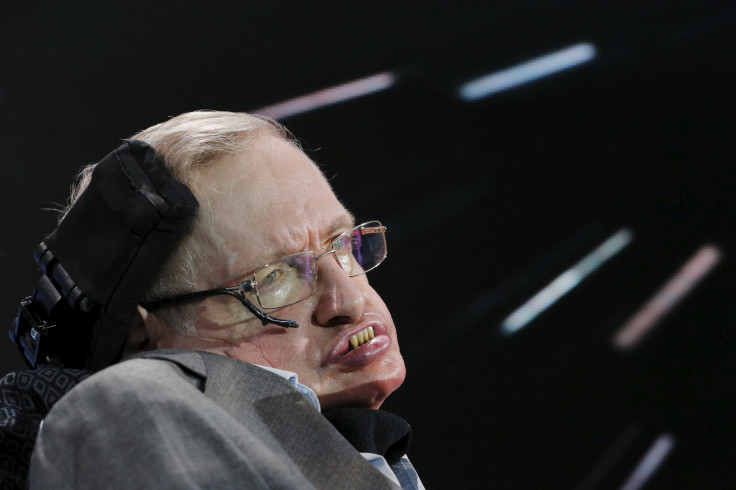7 Predictions From Stephen Hawking About The Future Of The Planet And Beyond

It’s been quite a year, with many wondering if 2016 was simply the worst year ever. Cambridge University professor and physicist Stephen Hawking, however, sees a much darker future ahead. Read on for the famed cosmologist's insight on the future.
We’re headed for disaster. “Although the chance of a disaster to planet Earth in a given year may be quite low, it adds up over time, and becomes a near certainty in the next thousand or ten thousand years,” Hawking, who is 73 and has been living with amyotrophic lateral sclerosis (ALS) for more than half a century, told BBC News in January. “By that time, we should have spread out in space, and to other stars, so a disaster on Earth would not mean the end of the human race.”
Read: Stephen Hawking Puts An Expiry Date On Humanity
But, he added, until humanity can live somewhere other than this planet, we’re walking on eggshells: “We will not establish self-sustaining colonies in space for at least the next hundred years, so we have to be very careful in this period.”
Unless we "transcend our limits." In one of Hawking’s more optimistic philosophical musings, the physicist contemplated the power of humans to go beyond our potential while speaking at the April launch of a space exploration in partnership with Facebook founder and chief executive Mark Zuckerberg and Russian entrepreneur Yuri Milner.
“What makes humans unique? I believe that what makes us unique is transcending our limits,” Hawking said at the launch of the $100 million so-called “Breakthrough Starshot” project, which intends to send iPhone-sized robots to Alpha Centauri, the closest star to our solar system—just 4.3 light years away. “Today we commit to the next great leap in the cosmos, because we are human and our nature is to fly.”
And stay united. The cosmologist hasn’t shied away from politics this year, assailing the populist movement’s taste for isolationism and calling President-elect Donald Trump “a demagogue who seems to appeal to the lowest common denominator” in a May interview with ITV’s “Good Morning Britain.”
Hawking had some harsh words for his own country’s politics, and worries for its future, as well, warning that a U.K. detached from the European Union would stymie the flow of students and researchers across borders, isolating countries off intellectually.
Read: Stephen Hawking Warns Of Intelligent Aliens
“Gone are the days when we could stand on our own, against the world,” he said. “We need to be part of a larger group of nations, both for our security, and our trade.”
Black holes might lead to other universes. Turning popular cosmological theory on its head, Hawking co-authored a paper published in the June issue of the Physical Review of Letters that described black holes as fountains, rather than prisons. It also described them as hairy.
“If you feel you are in a black hole, don’t give up. There’s a way out,” he said at an August conference in Stockholm. “The message of this lecture is that black holes ain’t as black as they are painted. They are not the eternal prisons they were once thought. Things can get out of a black hole both on the outside and possible come out in another universe.”
Still, Hawking said, while he’s “keen on space flight,” he’s “not going to try that.”
But aliens might lead to our deaths. In a 25-minute film called “Stephen Hawking’s Favorite Places,” which became available on the streaming platform CuriosityStream at the end of September, Hawking predicted the meeting between humans and alien life forms would not be unlike the Native Americans’ early contact with Christopher Columbus.
“As I grow older, I am more convinced than ever that we are not alone,” he said in the film, which catalogues the beginning of the universe and describing his latest project with Zuckerberg and Milner, “Breakthrough Listen,” which, like its “Starshot” counterpart, is also expected to cost $100 million. “After a lifetime of wondering, I am helping to lead a new global effort to find out. The Breakthrough Listen project will scan the nearest million stars for signs of life, but I just the place to start looking. One day we might receive a signal from a planet like Gliese 832C, but we should be wary of answering back.”
So will robots. “In short, the rise of powerful AI will be either the best or the worst thing ever to happen to humanity,” Hawking said in a speech at the launch of Cambridge University’s new Leverhulme Center for the Future of Intelligence in October. “We do not know which.”
More recently, he’s been a bit more blunt: “The development of full artificial intelligence could spell the end of the human race,” Hawking told BBC News in early December.
The deaths of our jobs, at least. In a Dec.1 op-ed for The Guardian, while reflecting on the populist and nativist political climate, Hawking warned of the more immediate, less “Terminator”-reminiscent ramifications of artificial intelligence.
“The automation of factories has already decimated jobs in traditional manufacturing, and the rise of artificial intelligence is likely to extend this job destruction deep into the middle classes, with only the most caring, creative and supervisory roles remaining,” he wrote. “This in turn will accelerate the already widening economic inequality around the world. The internet and platforms that it makes possible allow very small groups of individuals to make enormous profits while employing very few people. This is inevitable, it is progress, but it is also socially destructive.”
See Also:
© Copyright IBTimes 2024. All rights reserved.






















